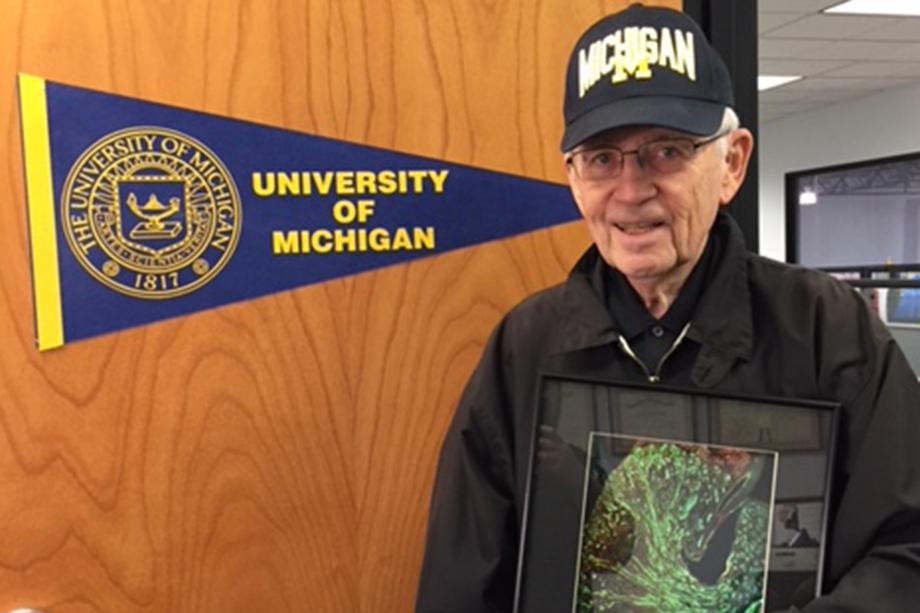A life in work
June 11, 2024
By Arnold Heyman‘s count, he held 32 different jobs from the time he started working until he graduated from medical school. His first full-time job came after the eighth grade, when he was just 14, and he worked as an office boy at a law firm for 48 hours a week at 25 cents an hour.
All of this youthful work experience left Heyman (LSA, ‘49) believing that the right kinds of jobs could make a big difference in a young person’s life. Eventually, he would act on this belief by starting a fund to support the library's student employees.
"Hey, doc"
From an early age, work was never far from Heyman’s thoughts. In fact, he chose his career at age 9 after an appendectomy that made a lasting impression.
“I got home from the hospital and just said, ‘I want to be a doctor.' And it actually made life very simple for me," Heyman said. "Unlike most teenagers having to make decisions about what they wanted to do for work, I knew exactly what I wanted to do, and everyone else knew too. So much so that in my yearbook, under my picture, it just said, ‘Hey, doc.’"
Heyman also knew from an early age where he wanted to go to college. Although he grew up in Ohio, he wanted to follow in his mother's footsteps, and she'd graduated from the University of Michigan in 1926.
Before he got to Michigan, he served in the U.S. Navy as a radar technician during World War II. He entered the university on the GI Bill, and lived alongside fellow veterans at the Willow Run manufacturing plant near Ypsilanti in temporary housing built for the workers who had put together half the nation's fleet of B-24 Liberator heavy bombers.
“They had bus service that ran frequently from the corner of South U and East U to Ypsi, so we were bused in every day, went to class, and went back; there was no real campus life for us vets because of our housing situation, but that was okay. Most of us were very serious about schooling, and there was nothing frivolous about our activity."
But Heyman went off the GI Bill after just one semester to save the benefit for something greater — his medical school tuition.
Paying his way
Coming off the GI-bill meant finding work to pay for tuition, food, housing, and everything in between.
Heyman joined a fraternity, motivated more by the cheaper accommodations than by the social aspects. He found work that paid in meals rather than money, one at the Brown Jug, and another delivering sandwiches and fruit to fraternities and sorority houses on Sundays, when their kitchen services were closed in the evenings. He worked summers back home in Ohio, digging ditches for the Ohio natural gas company, to pay his tuition and other expenses.
After his U-M graduation, Heyman went on to Northwestern University Medical School. The first two years of medical school, he used the remainder of his GI Bill to pay for his expenses. Without the GI Bill, he worked two out of three nights at St. Luke's Hospital to pay for the rest of his school expenses.
Following graduation, he served his internship and residency at Los Angeles County General Hospital and became a practicing urologist — a more than sufficient career for most people, but Heyman didn't stop there. Thirty-three years into his practice, he began to patent devices he'd invented to improve the care of his and other urology patients.
In 1985, he co-founded the business that he still owns today, now called Neotech, a Certified B corporation that makes products for neonatal and pediatric intensive care units, children's oncology, and home health care for children.
Investing in work
When Heyman, along with his wife Fern, began thinking about philanthropy, it was easy to land on the U-M Library because the library was vital to his success as an undergraduate — which was absolutely necessary to his goal of becoming a doctor — and was the place he spent the most time when he wasn't working for food or cash.
“I basically lived in the library. Every night after work at the Brown Jug I went straight to the library. And I would spend all day Saturday in the library studying as well,” he said.
The Dr. Arnold and Fern Heyman Endowment Fund, now in its 11th year, supports student employees, many through work-study jobs at the library. The fund has supported 50 students since its creation.
And the benefits to these student workers are more than just a payday. Studies have shown what Heyman perhaps intuited from his earliest days on the job: that students who work a modest number of hours a week have higher GPAs, graduate at a faster rate, are less likely to drop out, and have more job skills to include on their resumes.
by Alan Piñon
